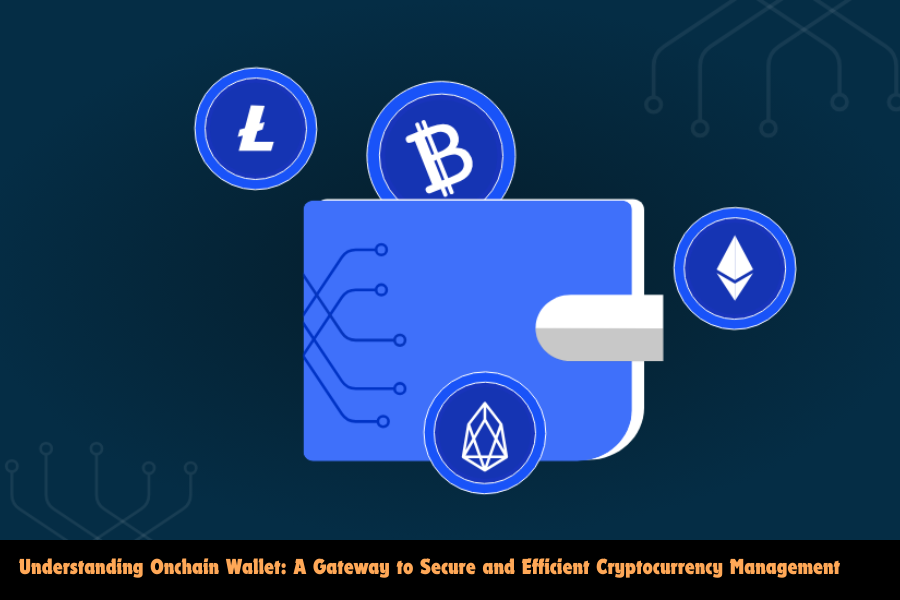The rise of cryptocurrencies has transformed the financial landscape, bringing forth numerous innovative tools for managing digital assets. One such tool is the Onchain Wallet, which allows users to interact directly with the blockchain. This type of wallet is essential for those who wish to have full control over their assets while ensuring maximum security. In this article, we will dive deep into the concept of on-chain wallets, their functionality, key features, and the advantages and challenges they present.
What Is an On-Chain Wallet?
An Onchain Wallet is a type of cryptocurrency wallet that enables users to store, send, and receive digital assets directly on the blockchain. The term “on-chain” refers to actions or transactions that occur on the blockchain itself, as opposed to off-chain activities, which take place on centralized systems or platforms. On-chain wallets are typically non-custodial, meaning that the user retains full control over their private keys and, by extension, their funds.
The primary appeal of on-chain wallets lies in their decentralized nature. Unlike custodial wallets, which rely on third parties (such as exchanges or online platforms) to manage private keys, on-chain wallets provide individuals with complete autonomy over their assets. This enhances both security and privacy, as only the user has access to the wallet’s private keys.
Wiki
| Feature | Description |
| Definition | An on-chain wallet is a type of cryptocurrency wallet that stores, sends, and receives digital assets directly on the blockchain, giving users full control over their funds. |
| Control Type | Non-custodial: The user controls their private keys and digital assets without relying on third parties. |
| Security | High: Uses encryption, private keys, multi-signature features, and optional hardware wallet integration to ensure asset protection. |
| Transaction Transparency | All transactions are publicly recorded on the blockchain, ensuring transparency and immutability. |
| Blockchain Compatibility | Supports multiple blockchains, including Bitcoin, Ethereum, and other networks (depending on the wallet). |
| Privacy Features | Often supports privacy features like anonymous transactions and allows users to maintain privacy on the blockchain. |
| Transaction Fees | Typically includes gas fees (network transaction fees), which vary based on blockchain network conditions. |
| Use Cases | Storing, sending, and receiving cryptocurrency, interacting with DeFi platforms, dApps, and participating in governance. |
| Recovery Mechanism | Generally no recovery options for lost private keys; users must securely back up their keys to avoid losing access to funds. |
| Popular Wallets | MetaMask, Trust Wallet, Exodus, Coinbase Wallet. |
| Accessibility | Available on both mobile and desktop platforms, making them accessible to a wide range of users. |
How Do On-Chain Wallets Work?
On-chain wallets function by interacting directly with the blockchain. Here’s a breakdown of the process involved when using an on-chain wallet:
Private Key Generation:
Upon creating a wallet, a user generates a private key. This key is crucial for signing transactions and should be securely stored. Losing access to this key means losing access to the digital assets stored in the wallet.
Transaction Initiation:
When the user wants to send cryptocurrency to another address, they initiate a transaction. This involves selecting the amount of cryptocurrency to send and specifying the recipient’s address.
Transaction Signing:
After the transaction details are entered, the wallet uses the private key to sign the transaction. This ensures that the transaction is authorized by the wallet owner and prevents unauthorized spending.
Broadcasting to the Blockchain:
Once signed, the transaction is broadcast to the blockchain network for validation. Miners or validators on the network verify the transaction and, once confirmed, add it to the blockchain ledger.
Transaction Confirmation:
Depending on the blockchain and network congestion, transactions may take varying amounts of time to confirm. Generally, after a transaction is recorded on the blockchain, it becomes immutable and secure.
Key Features of On-Chain Wallets
Onchain Wallet offer several features that set them apart from other types of wallets:
1. Non-Custodial Control
On-chain wallets are typically non-custodial, which means the user is responsible for their private keys. This gives users full control over their funds, reducing the risk of theft or loss associated with third-party custodians. As a result, users have sole ownership of their cryptocurrency and can transact without relying on a third party.
2. Security
Security is a top priority for on-chain wallets. They employ advanced cryptographic techniques to secure private keys and wallet data. Many on-chain wallets also offer additional security features such as two-factor authentication (2FA), multi-signature functionality, and hardware wallet compatibility for offline storage, further enhancing the security of assets.
3. Transparency
One of the primary advantages of on-chain wallets is the transparency provided by blockchain technology. All transactions made through an on-chain wallet are publicly recorded on the blockchain, making them verifiable by anyone. This transparency ensures that transactions are immutable and prevents fraud or manipulation.
4. Multi-Asset Support
Many on-chain wallets support a wide range of digital assets across various blockchains. This includes popular cryptocurrencies like Bitcoin (BTC), Ethereum (ETH), and many altcoins, as well as tokens built on specific blockchains, such as ERC-20 tokens. The ability to store multiple types of digital assets in a single wallet makes on-chain wallets a versatile tool for crypto users.
Advantages of On-Chain Wallets
Full Ownership and Control
The most significant advantage of on-chain wallets is that they provide users with full ownership and control over their cryptocurrency. Unlike custodial wallets, which store private keys on behalf of users, Onchain Wallet allow individuals to control their own assets without relying on intermediaries. This aligns with the decentralization ethos of cryptocurrencies, where users can transact freely without oversight from centralized entities.
Security and Privacy
Onchain Wallet offer enhanced security and privacy features compared to centralized wallets. Since users control their private keys, the risk of hacking or theft is minimized. Additionally, on-chain wallets often support features like anonymous transactions, giving users the ability to maintain privacy while transacting on the blockchain.
Interoperability with DeFi and dApps
Onchain Wallet provide seamless interaction with decentralized applications (dApps) and the decentralized finance (DeFi) ecosystem. Many on-chain wallets, such as MetaMask, allow users to access and use DeFi services like lending, staking, and yield farming directly from their wallet. This level of integration provides users with greater flexibility and access to a wide range of decentralized financial tools.
Direct Blockchain Interaction
On-chain wallets enable direct interaction with the blockchain, eliminating the need for centralized platforms that may impose additional fees or restrictions. This allows users to engage in network governance, participate in decentralized exchanges (DEXs), and vote on blockchain proposals, all from the security of their wallet.
Disadvantages of On-Chain Wallets
Private Key Management
With great control comes great responsibility. The biggest downside of Onchain Wallet is the need to manage private keys securely. If a user loses their private key or forgets their wallet password, they lose access to their funds. Unlike centralized services, there is no way to recover lost keys, which can be a significant risk for users who are not familiar with proper key management practices.
Transaction Fees
Every transaction made through an Onchain Wallet involves a fee that must be paid to the network validators. These fees, commonly known as “gas fees,” can vary depending on the blockchain and network congestion. While on-chain wallets are designed for decentralization, transaction fees can become quite high during times of network congestion, making small transactions less cost-effective.
Complexity for Beginners
For beginners, on-chain wallets can be intimidating. The process of creating a wallet, managing private keys, and understanding blockchain transactions can be overwhelming for users who are new to cryptocurrency. However, many wallet providers are working to improve user interfaces and offer educational resources to help new users navigate the complexities of on-chain wallets.
Popular On-Chain Wallets
Several on-chain wallets have emerged as popular choices for users looking to store and manage their digital assets securely:
MetaMask
MetaMask is one of the most well-known on-chain wallets, particularly for users in the Ethereum ecosystem. It allows users to store and manage Ethereum-based assets, including ERC-20 tokens, and interact with decentralized applications (dApps) directly from the wallet. MetaMask is compatible with both desktop and mobile platforms, making it a convenient option for many crypto users.
Coinbase Wallet
Coinbase Wallet is a non-custodial wallet that allows users to store a wide variety of cryptocurrencies and interact with decentralized applications. It is separate from the Coinbase exchange, offering users greater control over their assets. Coinbase Wallet is a user-friendly option, making it accessible to both beginners and experienced crypto enthusiasts.
Trust Wallet
Trust Wallet, a mobile-first on-chain wallet, supports a broad range of cryptocurrencies and tokens across various blockchains. It also provides seamless integration with DeFi platforms and decentralized exchanges. Known for its user-friendly interface, Trust Wallet has gained popularity for its simplicity and ease of use.
Exodus Wallet
Exodus is a multi-asset on-chain wallet that offers a built-in exchange feature, allowing users to swap cryptocurrencies directly within the wallet. It supports a wide range of cryptocurrencies and provides an intuitive interface, making it an excellent choice for users who are new to cryptocurrency but want access to advanced features like portfolio tracking.
The Future of On-Chain Wallets
As the cryptocurrency space continues to evolve, Onchain Wallet are expected to play a vital role in enabling users to interact with decentralized ecosystems. The growing adoption of decentralized finance (DeFi) and the increasing use of blockchain for various applications highlight the importance of secure, user-controlled wallets. Furthermore, advancements in blockchain technology and wallet development may lead to new features and enhanced user experiences, making on-chain wallets even more accessible and efficient.
Conclusion
Onchain Wallet are a critical innovation in the world of cryptocurrency, offering users direct control over their digital assets and allowing for greater autonomy, security, and privacy. By providing a decentralized approach to cryptocurrency storage and transaction management, on-chain wallets empower individuals to fully participate in the blockchain ecosystem. These wallets enable seamless interaction with decentralized finance (DeFi), decentralized applications (dApps), and blockchain-based networks, all while maintaining the highest level of security.
However, as with any powerful tool, on-chain wallets come with certain risks, such as the responsibility of private key management and the potential for high transaction fees. Understanding these aspects is crucial for anyone looking to use an on-chain wallet effectively. Despite these challenges, the continued development of on-chain wallets and their integration with a growing range of services suggests they will remain a cornerstone of the cryptocurrency space, offering users a secure, transparent, and decentralized way to manage their digital assets.
FAQs
1. What is an Onchain Wallet?
An Onchain Wallet is a type of cryptocurrency wallet that stores, sends, and receives digital assets directly on the blockchain. It allows users to interact with decentralized networks, offering them full control over their funds without relying on third-party custodians.
2. How does an on-chain wallet differ from a custodial wallet?
The main difference is control. In a custodial wallet, a third party (like an exchange or wallet service) holds your private keys, meaning they have control over your assets. In contrast, an on-chain wallet is non-custodial, meaning the user holds and controls their private keys and assets directly.
3. What are the benefits of using an on-chain wallet?
On-chain wallets offer several benefits, including:
- Full ownership and control: You are the sole custodian of your private keys and assets.
- Security: Enhanced security features like private key encryption and multi-signature support.
- Privacy: Transactions are transparent and secure on the blockchain.
- Seamless DeFi and dApp interaction: Easily access decentralized finance platforms and decentralized applications.
4. Are on-chain wallets safe to use?
On-chain wallets can be very safe if you follow best practices for securing your private keys. Ensure your keys are stored in a secure location (e.g., hardware wallet or paper backup), use two-factor authentication, and avoid storing your keys on shared or compromised devices.
5. How can I recover my on-chain wallet if I lose my private key?
On-chain wallets typically do not offer recovery options if you lose your private key, since they are non-custodial. This is why it’s crucial to back up your private keys securely and keep them in a safe, private location. If you lose access to your private key, your funds are likely irretrievable.
6. Do on-chain wallets support all cryptocurrencies?
While many on-chain wallets support a wide variety of cryptocurrencies, the range of supported assets depends on the wallet provider. Popular wallets such as MetaMask, Trust Wallet, and Exodus support multiple cryptocurrencies and tokens, including Ethereum-based tokens (ERC-20) and other blockchain assets.
7. Are there any fees associated with using an on-chain wallet?
Yes, every transaction made through an on-chain wallet involves transaction fees, known as “gas fees” in networks like Ethereum. These fees compensate network validators for processing and confirming transactions. The fee amount depends on network congestion and the complexity of the transaction.
Explore the latest news and updates on playhop THANK YOU!




